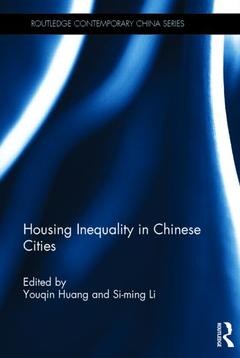Housing Inequality in Chinese Cities Routledge Contemporary China Series
Coordonnateurs : Huang Youqin, Li Si-ming

In recent decades, Chinese cities have experienced profound social, economic and spatial transformations. In particular, Chinese cities have witnessed the largest housing boom in history and unprecedented housing privatization. China now is a country of homeowners, with more than 70 per cent of urban residents owning homes, higher than many developed countries.
This book shows how China?s spectacular housing success is not shared by all social groups, with rapidly rising housing inequality, and residential segregation increasingly prevalent in previously homogeneous Chinese cities. It focuses on the two extremes of the residential landscape, and reveals the stark contrast between low-income households who live in shacks in so-called ?urban villages? and the nouveaux riches who live in exclusive gated villa communities. Over four parts, the contributors look at the degree to which inequality affects Chinese cities, and the extent of residential differentiation; housing for the urban poor, and in particular, housing for migrants from rural China; housing for the rapidly expanding Chinese middle class and the new rich; and finally, governance in residential neighbourhoods.
Housing Inequality in Chinese Cities presents theoretically informed and empirically grounded research into the polarized residential landscape in Chinese cities, and as such will be of great interest to students and scholars of Chinese studies, urban geography, urban sociology, and urban studies.
Part I: Housing Inequality and Residential Differentiation 1. Housing Inequality, Residential Differentiation, and Socio-spatial Stratification: Chinese Cities in the Early 21st Century2. Residential Change and Housing Inequality in Urban China in Early 21st Century: Analysis of Guangzhou Survey Data 3. Mobility, Housing Inequality and Residential Differentiation in Transitional Urban China: A Case Study of Wuhan 4. Neighborhood Differentiation and Inequality in Nanjing: Implications for Planning a Harmonious Society Part II: Housing for Migrants and the Urban Poor 5. Migration and the Dynamics of Informal Housing in China 6. Housing Access, Sense of Attachment, and Settlement Intention of Rural Migrants in Chinese Cities: Findings from a Twelve-City Migrant Survey 7. Effectiveness,Efficiency and Equity – An Empirical Evaluation of the Cheap Rental Housing System in Beijing, China Part III: Housing for the Middle Class and the Rich 8. The Gated Communities of Châteaux in China: Back to Feudalism? 9. The Imagination of Class and Housing Choices of the Middle Class: Case Studies in Shanghai and Beijing 10. Living the Networked Life in the Commodity Housing Estates: Everyday Use of Online Neighborhood Forums and Community Participation in Urban China Part IV: Neighborhood Governance under Housing Commodification 11. The Contentious Democracy: Homeowners Associations in China through the Lens of Civil Society 12. Managing the Nouveaux Riches: Neighborhood Governance in Upmarket Residential Developments in Shanghai13. Uneven "Right to the City": Theorizing the New Communal Living Space and a New Form of Urban Politics in China
Youqin Huang is Associate Professor in the Department of Geography and Planning at the State University of New York at Albany, USA.
Si-ming Li is Chair Professor of Geography and Director of the David C. Lam Institute for East-West Studies at Hong Kong Baptist University.
Date de parution : 02-2014
15.6x23.4 cm
Date de parution : 05-2017
15.6x23.4 cm
Mots-clés :
Chinese housing, Chinese cities, inequality, urban studies, urban geography, contemporary China, Welfare Oriented Housing System, Rst Century, Harmonious Society, Work Unit Compounds, Commodity Housing Estates, Commodity Housing, Municipal Housing Bureaus, Chinese Government, Property Management Agents, Property Management Company, Socialist Redistributive Economy, Work Unit Housing, Neighborhood Governance, Housing Inequality, CCP, Civil Society, Hukou Status, Public Rental Housing, CCP, Communal Living Space, Riverside Garden, Young Professional Middle Class, Upmarket Neighborhoods, Theil Index, Housing Choices



